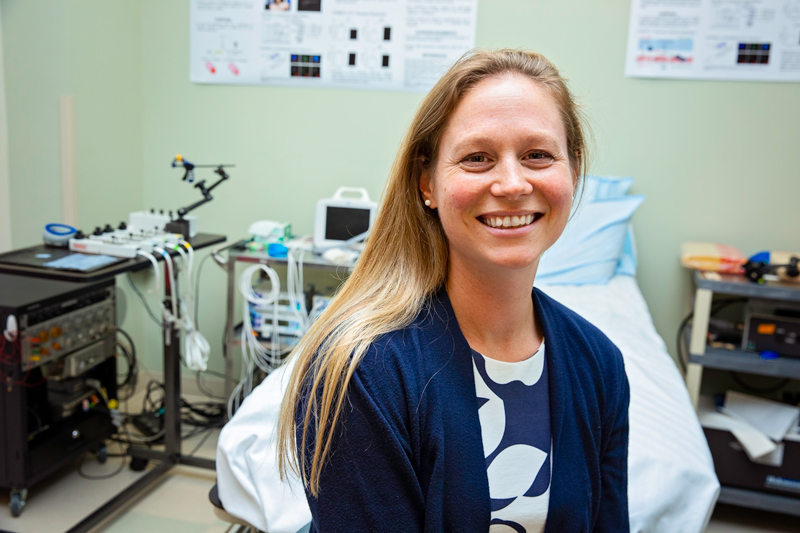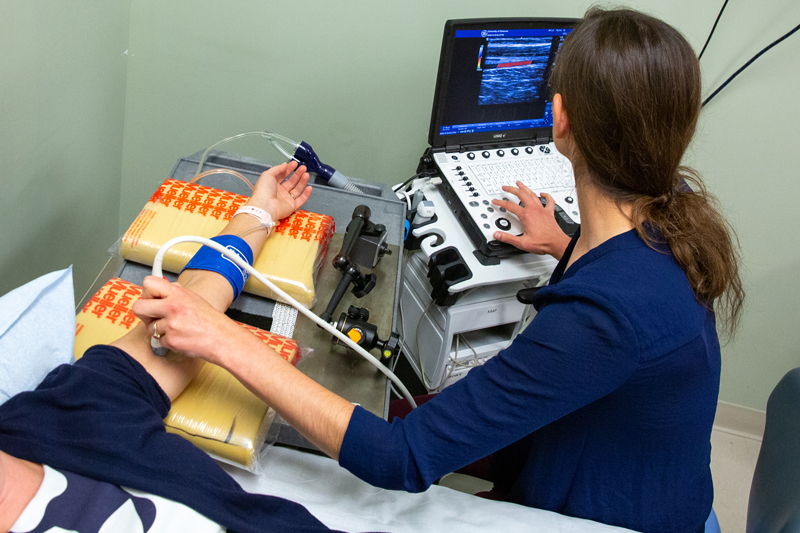


Getting to the heart of women’s health
Photos by Ashley Barnas February 26, 2020
CHS faculty studying change in blood vessels as a marker for future heart disease in women
Cardiovascular disease is the leading cause of death in women, accounting for about one in every five female deaths, according to statistics from the American Heart Association. While the overall mortality rates for heart disease have fallen over the past 20 years, there has been an increase in cardiovascular disease mortality rates for women ages 35 to 54.
Megan Wenner, an associate professor in the Department of Kinesiology and Applied Physiology at the University of Delaware’s College of Health Sciences, is studying whether early changes in blood vessel function in middle-aged women may be a marker for future cardiovascular disease. February is American Heart Month.
“In women, it is often thought that blood vessel function declines after menopause, when women lose the protective effects of estrogen,” Wenner said. “However, there has been some data within the last five years that suggests the decline in blood vessel function begins to occur earlier, during the transition to menopause or perimenopausal period.”
In 2019, Wenner received a $2.29 million grant from the National Institutes of Health to learn more about the mechanisms that impact blood vessel function. Knowing more about why this function starts to decline — as well as the potential role of estrogen in maintaining vascular health — could help to develop new strategies aimed at improving cardiovascular health in women.

Estrogen affects almost every organ in the body. Within the cardiovascular system, it is credited with relaxing and dilating blood vessels so blood can flow more freely. But as women approach menopause, more than just their estrogen levels change. So can the walls of their blood vessels, making it more likely for plaque and clots to develop.
‘We’re focusing on perimenopausal women because it’s the time when women start to experience erratic fluctuations in their hormones, which coincides with changes in their cycle as well as symptoms like hot flashes,” said Wenner, who directs the Women’s Cardiovascular Research Lab, located in the Health Sciences Complex on UD’s Science, Technology and Advanced Research (STAR) Campus. “They may have fluctuations, like bleeding more frequently or getting other symptoms.”
For the study, Wenner’s lab is recruiting women ages 20 to 60 to look at their endothelial cells, a thin layer that lines the inside of blood vessels. Using a non-invasive procedure, Wenner’s team is measuring how well blood vessels dilate in women at various stages of menopause, as well as to see how changing levels of estrogen affect the endothelial cells and how well these blood vessels can dilate.
Wenner said researchers are interested in understanding how a woman’s reproductive history also impacts her risk of cardiovascular disease. Blood vessel function — how well the vessels can contract and expand — is considered an important biomarker for coronary health and one easily measured.
“The idea is that you can have a group of women who are the same biological age, but they are different reproductive ages,” Wenner said. “Some could still be cycling. Some could be perimenopausal and others postmenopausal. That’s going to have more determinants on their health than just their biological age.”
Understanding more about the mechanisms of these vascular changes could help researchers understand pathways to help with interventions to improve health, Wenner said.
Contact Us
Have a UDaily story idea?
Contact us at ocm@udel.edu
Members of the press
Contact us at 302-831-NEWS or visit the Media Relations website

